Supreme Court rejects Trump's final legal challenge to 2020 election results

The U.S. Supreme Court has declined to hear the Trump campaign’s lawsuit against the Wisconsin Elections Commission over its handling of the 2020 election, dealing the final blow to his election legal challenges.
In an order released Monday morning, the Supreme Court allowed for a lower court decision in favor of the elections commission to stand. The case was Trump’s final remaining legal appeal of his three challenges to the results of the 2020 presidential election.
At issue was a unanimous opinion by a three-judge panel of the Seventh U.S. Circuit Court of Appeals released last Christmas Eve. The appellate court ruled that Wisconsin lawfully appointed its representatives for the Electoral College.
The case dealt with whether the Wisconsin Elections Commission and local election officials violated federal law by implementing unauthorized absentee voting practices inconsistent with state law and whether the state’s election should be declared void.
The Supreme Court’s rejection Monday came without published dissent or comment.
The Seventh Circuit’s three-judge panel, which consisted of three Trump appointees, had previously ruled that “the errors that the President alleges occurred in the Commission's exercise of its authority are in the main matters of state law.”
“They belong, then, in the state courts, where the President had an opportunity to raise his concerns,” the lower court’s majority opinion states.
“For our part, all we need to say is that, even on a broad reading of the Electors Clause, Wisconsin lawfully appointed its electors in the manner directed by its Legislature.”
Democratic presidential nominee Joe Biden defeated Republican incumbent Donald Trump in an election held during the coronavirus pandemic. Biden narrowly beat Trump in the battleground state of Wisconsin, which Trump won in 2016, by about 20,000 votes.
From the onset, Trump disputed the election results, with his campaign filing lawsuits in multiple states, accusing officials and others of engaging in extensive voter fraud.
However, legal efforts in states won by Biden were rejected by courts. Trump filed three appeals to the Supreme Court near the end of his presidency — two in Wisconsin and one in the battleground state of Pennsylvania. All three have been denied.
Last month, a majority of the high court declined to hear the Trump campaign’s legal challenges to the Pennsylvania Supreme Court’s authority to extend the state’s mail-in ballot deadline three days past the election.
Regarding the Pennsylvania decision, Justices Clarence Thomas, Samuel Alito and Neil Gorsuch disagreed with the refusal to grant certiorari. Thomas wrote an 11-page dissent.
Thomas argued that while the Constitution says that the state legislature is responsible for setting election policy, "nonlegislative officials in various states took it upon themselves to set the rules instead" before and after the 2020 election.
“We failed to settle this dispute before the election, and thus provide clear rules. Now we again fail to provide clear rules for future elections. The decision to leave election law hidden beneath a shroud of doubt is baffling,” wrote Thomas.
“By doing nothing, we invite further confusion and erosion of voter confidence. Our fellow citizens deserve better and expect more of us. I respectfully dissent.”




























